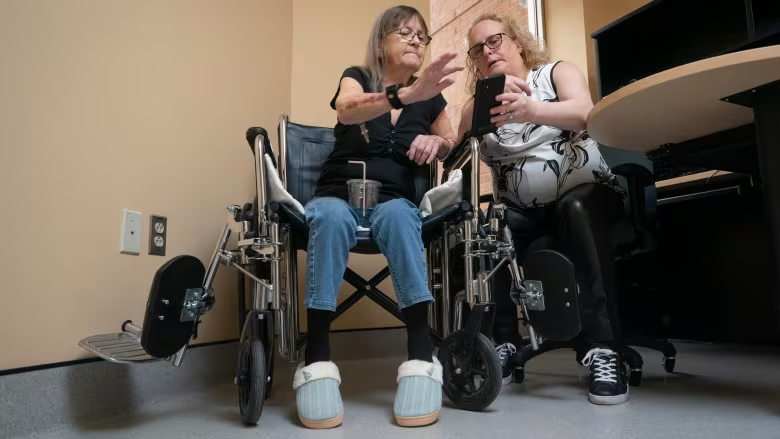
Sharon Dubiel, with the CIUSSS de l’Ouest-de-l’île-de-Montréal, helps patient Danielle Lacasse, left, understand her new health-monitoring devices. (Ivanoh/DemersRadio-Canada)
Some hospitals in Quebec are turning to virtual healthcare to address bed shortages and provide remote monitoring for patients recovering at home. Danielle Lacasse, a patient at Montreal's Lakeshore General Hospital, was discharged early and provided with a smartwatch and cellphone for virtual monitoring. The program, launched in February 2024, currently serves five patients, with plans to expand.
Dr. Amar Bhindi, the program coordinator, explained that Lakeshore Hospital faces bed limitations despite a growing population. The virtual care initiative aims to increase bed capacity by remotely monitoring patients recuperating at home. Sonia Bélanger, Quebec's minister responsible for seniors, initially proposed eight similar programs by 2024, but only four have been implemented to date.
Virtual care involves sending patients questionnaires about their health status via text twice daily and providing access to a nurse 24/7. Patients like Lacasse appreciate the freedom and comfort of recovering at home. However, the transition from traditional in-hospital care to virtual monitoring poses challenges for healthcare providers. Dr. Chantal Vallée from CISSS de la Montérégie-Centre emphasized the need to convince doctors of the feasibility of remote monitoring.
Despite initial hesitations, hospitals like Charles-Le Moyne Hospital are embracing virtual care to adapt to changing healthcare needs. CISSS de Laval successfully integrated virtual care into its services, with plans to expand monitoring to 20 patients. The program employs a team of nurses and doctors who conduct home visits and monitor patient vitals remotely.
Overall, the adoption of virtual care reflects a shift towards innovative healthcare delivery methods to accommodate an aging population and address resource constraints in the healthcare system. The project's success will depend on overcoming logistical and cultural barriers and ensuring that patients receive adequate support and monitoring while recovering at home.















